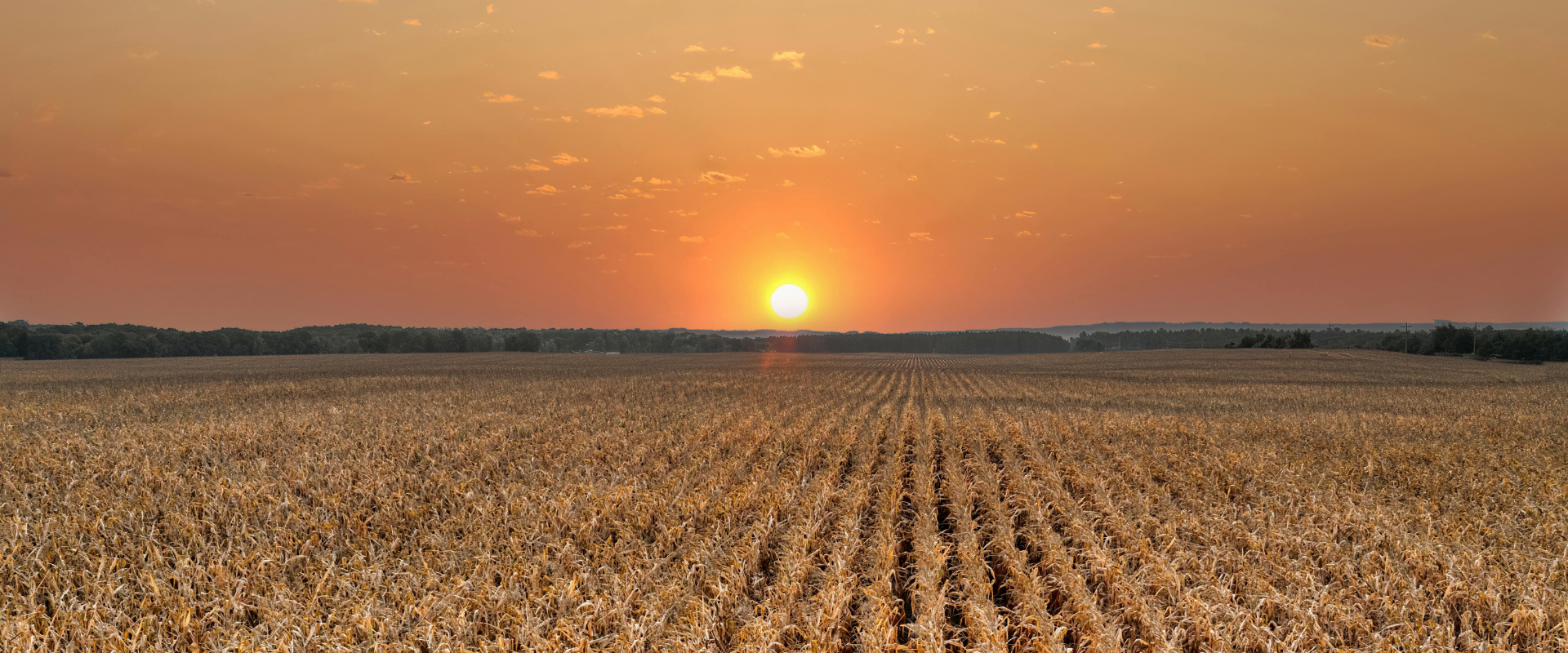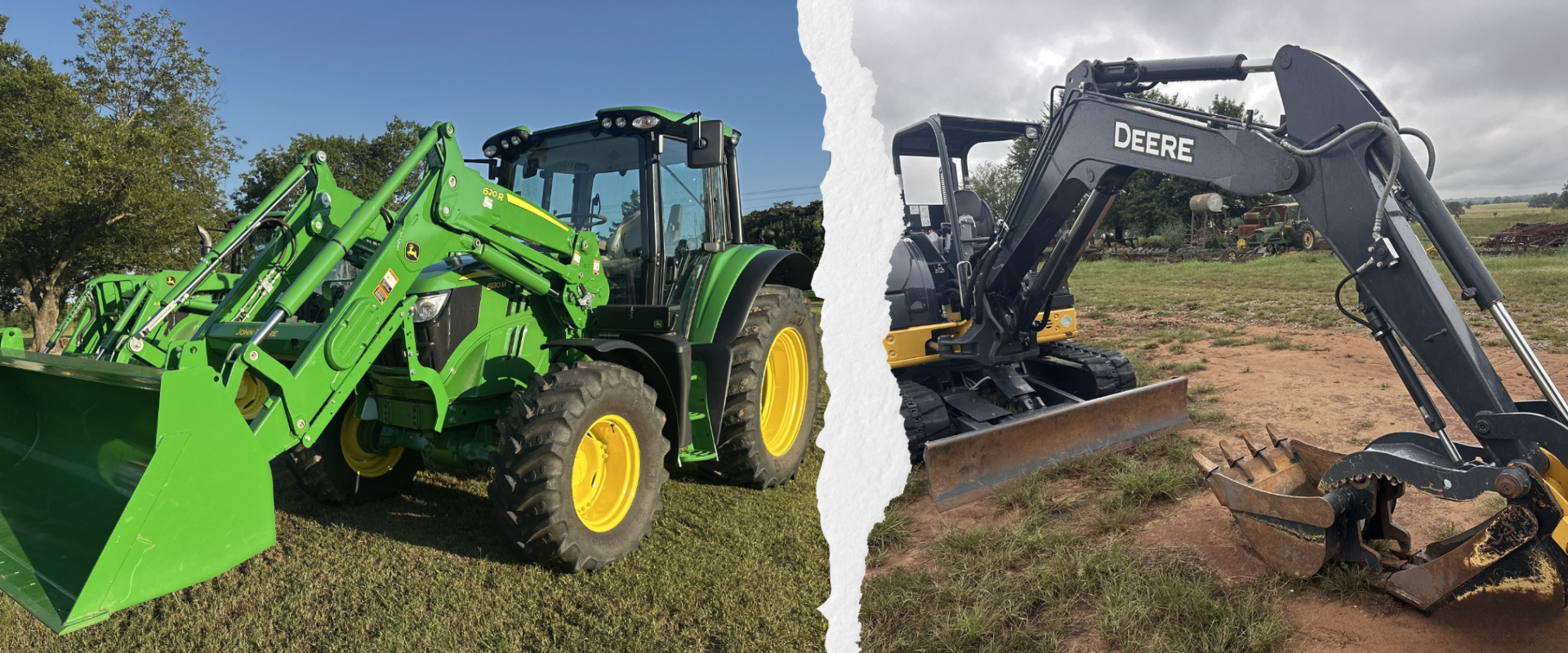In this episode of GEAR UP, Co-founders Mark and Ron Stock take us inside the resilient, multifaceted world of American agriculture. As National Farmer's Day approaches, the hosts celebrate the grit, expertise and community spirit of the American Farmer. From weathering the Dirty 30’s to embracing cutting-edge tech, these unsung heroes power on and serve our nation with unwavering optimism. Listen in today as we Gear Up and Thank the Farmers!
Listen Now: https://www.spreaker.com/episode/episode-10-national-farmer-s-day--62285068
Also available wherever you get your podcasts.
Watch it here: https://www.youtube.com/watch?v=g0llJ-OQcF8
To watch the full video click here:
Transcript:
Mark Stock 00:17
All right, folks, we're gearing up brought to you by BigIron, and today we're going to talk about National Farmers Day. Which is on October the 12th. And as our listeners probably know, Ron Stock, the farming communities and farmers are very dear to our hearts, because that's what we did all our life. We still actually do that today. And we're going to talk a little bit about the history of agriculture, farming and how it has impacted our careers, how it's impacted most of the people that work within the BigIron organization as well. So Ron Stock, you know, gear up. What's up?
Ron Stock 00:55
Well, you know, National Farmers Day. I mean to me, every day is farmers day, you know, because farmers feed America. You know, I think farming, farmers are one class of people that's really one work area, people that's really not celebrated enough. Because the farmers that made it through the 80s, the tough times and the dirty 30s, you know, generational farmers. That was an amazing deal. You know, the dirty 30s, people had to exit farming because there just wasn't any money. I'm really impressed by the farmers who farmed in the 70s and 60s and 50s, because they did not have crop insurance. Crop insurance came about in the early 80s. And, geez, these guys used to go out there, and couples used to plant corn, and
Mark Stock 01:07
It was a make it or break it.
Ron Stock 01:48
If it didn't rain. I mean, you literally knew you weren't going to leave. You're just hoping the garden grew and you had some animals that didn't get sick because you were going to starve to death.
Mark Stock 01:58
So how do you handle all those folks that say, Geez, farmers are just so highly government subsidized. There's no risk involved anymore.
Ron Stock 02:07
Corn. Raising corn is a national security issue. I mean, you got to have the grain. It's a powerful thing. So it is something that needs to be helped out by the government, because it's national security that we raise a corn crop that we raise food and beef, and so I remember my grandpa telling me, who was born in 1905 that you're really just working for the government, because government has the programs, and without the government, you can't survive, and it is 100% that way it is today, without government intervention in some of these programs, like, Look at the price of corn now. The price of corn is now under $4 a bushel, folks. And break even is in the low fours. $4.25, if you got your land kind of paid for, if you're renting, it's $4.75, a bushel. You know, without government involved, agriculture doesn't survive a lot of times.
Mark Stock 02:58
Well, we grew up on a farm, and we come we're products of the, you know, early 80s, and that's when dad said, "you guys, I don't have enough revenue here right now to, you know, to pay you guys, so you're going to have to figure out a way to generate some revenue", which is why you got in the auction business. But we still farmed, as we were in the auction business. And I think one of the reasons why we were successful in the auction business is when we would show up on somebody's place and they wanted to sell a planter. We could talk planters. We could we could recognize the Yetter openers, or the Groff openers, or we could talk about the spiked closing wheels, or you're totally tubular on that machine. And how many gallons of fertilizer are you putting in? Are you putting in 1034, or what are you putting down as a starter? And so many other auctioneers were just auctioneers, you know, they might have been grown up in the cities or in the towns or and a lot of them are still ag influence related to as well, but we could really relate to those people that wanted us to hire their staff. Because I know if somebody walked into my place and I asked them to sell a tractor, and I said, I want you to sell the 4440 and I had a 4440 and a, 4950 and a, or 4955 sitting in the yard. And if they from from the distance going, which one are you talking about? That one or that one, I would have never hired them. You know, I wouldn't have been comfortable having somebody sell something for me that they didn't even know what it was. As National Farmer Day comes here in October. And have we seen all of the advances in just the last, you know, 20 years in farming, and how this year we're going to be looking at a harvest that is going we're going to see a lot of 300 bushel corn. Why do you think that there's 300 bushel corn, though, is it just because of rain?
Ron Stock 04:53
One of the things I think, and I was just having a friendly debate with a seed corn dealer the other day, the seed corn dealer I was talking to was very humble, and he says people are now spraying for fungicide, you know, taking care of the crop better. They're monitoring the water better. They're putting fertilizer on a little at a time, instead of all of it in the fall or the spring. So he said, it's really not all the technology in the bag. It's about the better farming practices. But, you know, there's a local farmer here in Columbus about five years ago. Always heard they raised 300 bushel corn. So I made a round with them in the combine, because several rounds, fact, I spent about two hours in the combine with them, and it was going 300 bushel across the field five years ago. But these guys are exemplary farmers. I mean, everything is always perfect.
Mark Stock 05:34
Farming is is way more than just planting seed, fertilizing it and harvesting it. So farming is, I talk about this, a farmer has about seven or eight different degrees. If you went to college. Okay, first of all, you would be, you'd have a degree in machinery. Okay.
Ron Stock 05:57
Mechanized ag. Probably still true today.
Mark Stock 05:58
Mechanized ag, you know how the machine works. And you'd even have a degree in engineering, because you would take a piece of machinery and you would alter it because it wasn't done quite right. So they will fix it better than what it come from the factory, or they will tell their dealer that you need to make these adjustments to it because it's not doing the right thing. They know how to run a welder, they know how to run an angle grinder. They know how to run a drill. They know the difference between a grade five bolt and a grade eight bolt is okay. They can do all those things, and they can make that machine operate better than it did when it was brand new. That's one degree. Another degree that a farmer has is a marketing degree, because if you don't understand how to market your commodity, you're going to be left in the dust. I remember when I was in high school they said 70% of the grain is sold at the bottom 30% of the market. And the ones that are surviving are the ones that are focusing on what their inputs are, what their costs are, where their breakevens are, and they've got the tenacity to pull the trigger when they're in the profit zone, and that profit zone is a very short time number, but you have to be able to market so you have to have a marketing degree. You have to have an HR degree, because now you're working with all of the help, unless you're a one person show farming, but then you're farming ground that's probably paid for, because you can do that, or else you have to have a job in town. But if you're farming a couple 1000 acres, you can't do it by yourself, so you either have to have a full-time person to help you, or several part-time people to get you through. So you have to have the people skills to work with the people to help them work with you. So that's another degree. How many other degrees are there Ron Stock?
Ron Stock 07:56
Got to have an accounting degree. I don't know too many farmers that aren't good with math. I mean, they're all good with math. They know numbers on the top of their head, very good with math. You also probably have to have a chemical degree, because you've got to mix chemicals in a certain amount, like two quarts per acre, two pints per acre. And you definitely have to have an agronomy degree. You've got to have a psychology degree. You've got to understand yourself and your banker, and you got to understand your help. You got to be able to deal with stress. And you got to kind of have the personality where stuff just kind of rolls off you. You know, you particularly ranchers. Geez, they go out there, and they go out there and the bad weather and the cold, and they got this calf, it's not taking to its mother, so they take the calf and they put it on another cow. They just lost her calf, and in the barn. They go out in the barn that next morning, and they've spent two or three days with this calf, so they're kind of attached to it. They go out there the third day, and the calf is dead. Cow kicked it, killed it, and you got to go back in the house for breakfast and be in a good mood, because you don't want to ruin everybody else's day. So you got to kind of be a caring person that can let stuff like that go. You know, get some really bad news. You know, farmers are tough. I remember the time when talk about farmers being tough. My grandparents, my grandfather, he said that him and the hired man were out there on the porch, and they had really good looking corn crop, and they were gonna get ready to celebrate life that evening, and the grasshoppers that looked like a storm coming, you know, like the clouds coming. It was gonna be a nice rain, beautiful crop coming, and it was grasshoppers. And he said the only reason he survived is because the hired man had been bragging to him two or three days later, he says, Frank, come in here. He goes look in the barn. If you can find any light in this barn, because it was a sunny day, and they closed the doors and around the doors. He was so proud. He had spent a lot of time with a file making sure all the doors closed so there was no light in the barn. And he said, The reason they survived is because if there was a little hole, the grasshoppers got in the barn and they ate your hay all down. And he goes, I had hay that was worth 200 bucks a ton, and it wasn't all eaten up. So he says, that's how he survived, because his hired man was had the silly deal he wanted to barn with no light coming through, so you never know what job you're doing in farming. That's a good example of a job that's so trivial you never know when the job you're doing that's so trivial that ends up being the job that saves the day.
Mark Stock 11:49
So farmers, they have to be people, people, and they also can be introverts, right? You can be you can have both types of farmers. Some people just like to spend it all by themselves. Go out there, do their own thing, and the next person likes to make sure they're on the golf league and make sure that they're going to the wing nights and the whole nine yards and the and the introvert is just kind of grinding it out all by themselves. It's a great profession if you want to be out with nature, but there's a tremendous amount of risk involved. So if I had a job working at a manufacturing plant, my risk in that job is hopefully the company's making money so I can stay employed. I'll throw money in the 401K and I have to work there at a specific time, five days a week, and if I miss a couple days, they'll probably fire me, right? In in agriculture, if it rains, you go in the shop and you fix something in the shop, but maybe you can sleep in a half an hour, because you just stayed out there till midnight the night before. And, you know, there's gives and takes on everything. And a lot of people wonder why people farm. A lot of people think, geez farming is a very easy profession, and some people think farming is a real hard profession. I know that we have five sisters, and I've got five brother in laws, and they all have different opinions on, you know, what they do and what farmers do. And it's it's fun just listening to their perspectives on how hard or easy farming is. So, I can only imagine conversations people have when somebody's farming, and their brother or sister is not a part of farming, and how they think that the life of being a farmer really is, but it's a heck of a risk right now, if you don't own the land, and you're renting it, according to all my numbers, I mean, you're going to have on a quarter ground. 160 acres. You're gonna have $800 an acre just putting the crop in. So 160 times, $800 you know you gotta, you gotta be able to stomach that, and you gotta hope the heck there's something there to pay that back, which is why the government subsidizes with crop insurance. But we still have to take the crop insurance. We want to celebrate, though, that the farmers are are eternal optimists. Every year we think we're going to have a better year than we did the year before, and we plant that seed in the ground with no other thing, other than hope and a lot of hard work. Because, I mean, you miss in here in Nebraska, we're, we're irrigation, you know, we just come back, you know, I travel a great part of the country all the time, and you come back from those areas where they are having a tremendous crop, and they don't have to irrigate anything they they're working in the mud, you know, they're mudding it in. We're planting in the dust, and then we water it to get it up. So there's different people listening to this in different parts of the country, you know, not understanding exactly how it is. I love the way the places in the I states, they have such beautifully groomed lawns and road ditches, and their waterways are perfect. And in Nebraska, they're out there running a pivot, getting a pivot unstuck almost all the time. So the places might not look so quite so shiny, because they got to raise it another way. So agriculture is different in all parts of the country, just support your farmers and ranchers, because what they're going through in one state is not what they're going through in another. And it may be easier, it may be harder, but in the other state it might be harder, and the other state might be easier.
Ron Stock 16:57
I'd like to add something to before we forget being out in the field, one of my biggest surprises, starting 30-40, years ago, was how many smaller farmers there are. And for our listeners, I want you to know you always hear about the big farmer, the big name farmers. There are way more 1000 Nebraska, there are way more, less than 500 acre farmers than there are any farmers farming over 2000 acres. So you only hear, we only hear about the big ones, the big name ones, but there's gazillion of, let's just call them smaller farmers out there. And I told some young men this the other day, when I was at the Farm Progress Show two young men 20-21, years old. They were there with their grandpa and their dad. And these young men wanted to be farmers. And I said, let me tell you, the best lifestyle is farming 300-400 acres and having a job in town. You've got the benefits, you've got the insurance, a job in town, and you come home on the evenings and weekends and farm. I go this farming, this farming big it's not all what it's cracked up to be. And if you want to have a really good life, guys, just farm 200 or 300 acres and have a nice life. And their dad and their grandpa could have kissed me. They're just like, Yeah, you tell them they got these big dreams and want to do this, do that. I go, guys just farm a little bit and have a good life.
Mark Stock 18:16
Well, we honor and support the farmers and the agriculture industry. Farmers are very loyal to their communities. They're very loyal to their schools, their churches. They give back when they have a good year, they share in the abundance and the bounty of their crop when they have a bad year, you know, they still survive. They still they still believe next year is going to be a year to make it happen. So hats off to all the farmers in agriculture. We're celebrating National Farmers day here on October the 12th that started back in the early 19th to late 19th century, earlier 20th century, where they were just honoring people that farmed. But back in those days, Ron Stock,
Ron Stock 19:06
Everyone was a farmer.
Mark Stock 19:07
Everybody was a farmer. Now, less than 2% of the population is a farmer. And an interesting statistic that, since all of our baby boomers are hitting this certain age group right now there are 10,000 let's see 10,050 people retiring every day across the United States of that age group. So if 2% of that population is farmers, we've got 200 farmers making the decision to retire every day until the year 2030 so there's a lot of people retiring, so the folks that want to be in agriculture that there's going to be some opportunities, go help somebody that's close to retirement age and ask if they need some help, and work with them for a couple years, and then see if they'll rent that ground to you. Or see if they can, will sell that farm to you and help you get a good start, but you're going to have to show up on time, because you're working with somebody that always took very much pride in what they did. You know that that 65 to 80 year old person that's still farming, they still are very proud people in doing quality work and being there. The saying is always goes, if you are 10 minutes early for a job, you're already late because they wanted to be there 15 minutes early, and then they wanted to stay longer than what they were supposed to because they were making sure that the job was done before they left. So for all those folks that want to get in agriculture, there's a lot of people retiring, the door is open, if you go look for them and then do what Tom Brady said in his speech when he got enrolled into the into something. I don't know what it was, but it says, you know, it's hard work, and nobody's entitled to anything. You just have to work hard at it to get to the next level. We are talking about National Farmers Day, and we hope that you enjoyed our just random discussions about the thoughts that Ron and Mark have. And we're gearing up for a great holiday that I don't even know is a national it's just a national day. It's not a holiday. It probably should be a holiday, but farmers won't take that holiday off, because you still got to feed the cattle, still got to watch the pigs, you still got to harvest, because October 12, we're in peak. I mean, I don't think anybody's going to shut down the combine. They'll do that when the harvest is done, and then they won't do that either Ron Stock, because now they're going to go out there and get the field prep for next year, for whatever they're going to do to it. The electric posts are going to go in in a lot of places, because cows are coming in. Or else, somebody's going to do some deep tillage, because the soil never you know it's too wet. They got to dry it out so a farmer will never stop. So we salute farmers, and we want to thank them for everything they do.
Ron Stock 22:10
Thanks, guys, gals.
Mark Stock 22:12
Gearing up!




